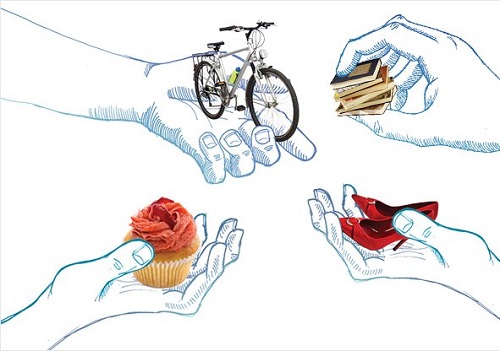Trading goods and services without using cash… A powerful idea, isn’t it? While the history of barter stretches back to as far as 8000 years ago, one would hardly guess that even today, according to the US Department of Commerce, barter exchanges account for over 30 percent of the world’s total business.
But barter isn’t just a B2B interaction: During the pandemic, cashless transactions have seen an impressive renaissance even among individuals. For people trying to confront their complex, everyday problems, barter emerged as a creative solution helping them access goods and discover new, unseen value in the skills and items they possess.
Now, it’s time for the social impact world to catch up. By implementing barter, different groups, NGOs, and social leaders can actually overcome many notorious challenges, transform their operations, and even achieve greater independence in resource collection and utilization.
How can social change organizations benefit from barter – both for themselves and through encouraging it in their target communities? And what are the challenges along the way?
Using barter for internal operations
“Stronger together” has been a longtime aspiration within the social impact realm. But with conflicting goals, limited funds, and clashing donor interests, meaningful collaboration has remained a distant pipedream for many. This is where barter joins the equation: It can help cultivate positive collaboration networks that allow organizations to maximize their potential and resources. And with barter encouraging exchange, rather than production, incorporating it can help organizations achieve their environmental goals as well.
For example, if there is an organization that doesn’t have a critical resource like a professional-quality camera, they can turn to someone that will exchange one for a research methodologies workshop series. Connecting organizations like this over cities, regions, and even countries could bring a new era of collaboration and agency.
However, donors can join the equation too. So often, positive impact can be generated even without giving cash. Imagine an individual converting a couch into a donation for operations, or volunteer their time as a photographer. Organizations, on the other hand, can use barter to offer valuable services and skills which could be as diverse as organizing child protection training or basket-making workshops, and donate materials they don’t use anymore.
Encouraging barter in communities
All over the world, social organizations are working hard to support positive change, but the complex environments they operate in often make it difficult. Interestingly, barter is already present in many cash-less communities. By scaling it further, organizations can contribute to greater resilience. A strong barter system can form the base of positive interactions and promote increased cohesion within a group of diverse actors.
When we look to developing economies, where people may often face financial hardship but increasingly have smartphones and internet access, the possibilities to make a positive impact are endless. In such circumstances, an easily accessible barter system can truly help people in far-reaching ways.
For example, a Nigerian goat farmer has a broken water pump. A mechanic in a nearby village has a child who needs shoes for school. And a leatherworker nearby needs more food to feed his family. With a multiparty barter – that is more flexible – it’s possible to find matching needs across tight-knit communities. Organizations will see that barter can present a sustainable, long-term solution that empowers communities to thrive without the need for mass organizations as intermediaries to be involved.
What’s standing in the way?
Even though the barter system can be well set up, with established rules about the subjects of exchange and the participants, there are still two main challenges to watch out for.
First, potential disruptions to the exchange and its delivery. In the case of inter-organizational trade, there needs to be commitment and buy-in from all sides involved. For instance, if your organization decides to exchange a skill, there needs to be clear delegation as to who exactly will deliver the training and how. In the case of communities targeted by organizations, security among populations is a risk. Interestingly, while barter can be threatened by insecurity, it’s also a way to resolve it. Creating systems and micro-processes for communities in distress builds up resilience. However, there need to be processes that decrease the risk of outside, malicious actors affecting the trade or its circumstances.
The second challenge is scaling. It is possible to implement barter manually with a limited number of actors, but to really establish long-lasting and robust networks, there need to be tools and systems in place – both in organization-organization barter, or at the community level. At have|need, we have analyzed these situations and designed a “Group Loop” feature, where specific communities (like a neighborhood, social club, or a charitable organization) can interact and engage in private, safe barter among a well-defined and secure group of participants.
Leveraging technology to advance meaningful change is no novelty. But by utilizing it to give life to concepts that have been tested and proven over thousands of years, we can discover a powerful marriage of impact and accessibility for all.
Josh C. Kline is an Emmy-award-winning founder, TED speaker and CEO of social impact startup HaveNeed, an app introducing multi-party bartering in the market. Josh stepped away from a 25 year career in media tech to build a social impact startup with the goal of delivering impact at global scale in the form of the first consumer multiparty barter platform for goods and services.


